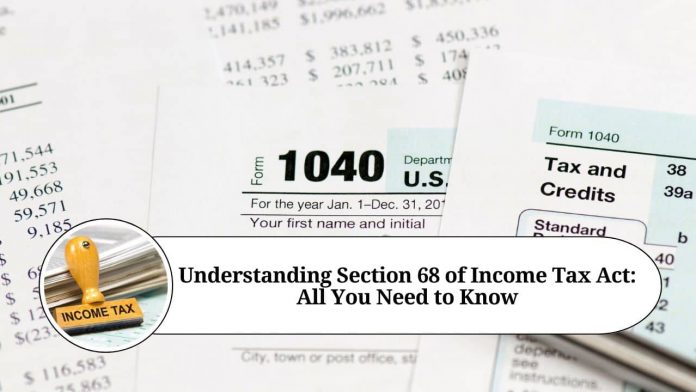Section 68 of the Income Tax Act, of 1961, deals with cash credits in the hands of the taxpayer. It is an important provision that helps to keep a check on the source and legitimacy of the funds that are deposited in the bank account of a taxpayer. In this article, we will discuss the provisions of section 68 and understand its implications for taxpayers.
Understanding Section 68 of the Income Tax Act:
Section 68 of the Income Tax Act deals with unexplained cash credits in the hands of the taxpayer. It states that if any sum is found credited in the books of accounts of the taxpayer and the taxpayer cannot provide a satisfactory explanation regarding the nature and source of such sum, then the sum is added to the total income of the taxpayer for that assessment year.
The section applies to all types of taxpayers, including individuals, HUFs, companies, firms, etc. The provision also covers cash deposits made in a bank account, not just cash credits. It is important to note that the section applies only to the taxpayer who has received the sum and not to the person who has made the payment.
Implications of Section 68:
The main objective of section 68 is to prevent taxpayers from introducing unaccounted income into their books of accounts. The section aims to bring transparency and accountability to the financial transactions of taxpayers. If a taxpayer cannot provide a satisfactory explanation regarding the source of the cash credit, then the sum is added to their total income, and the taxpayer is required to pay tax on it.
However, there are certain exceptions to the application of section 68. For instance, if the sum is received from a close relative, then the taxpayer is not required to explain the nature and source of the sum. Similarly, if the sum is received as a gift, then the taxpayer is not required to pay tax on it, provided the sum is within the prescribed limit.
Procedure for Assessing Cash Credits:
When a taxpayer is found to have unexplained cash credits in their books of accounts, the assessing officer issues a notice to the taxpayer, requiring them to explain the nature and source of the cash credit. The taxpayer is required to provide evidence and documents to support their explanation.
If the explanation provided by the taxpayer is not satisfactory, the assessing officer may add the sum to the total income of the taxpayer and levy tax on it. The taxpayer may also be subject to penalty and prosecution under the Income Tax Act.
Read Other Useful Blogs:
Conclusion:
Section 68 of the Income Tax Act is an important provision that helps to ensure the transparency and accountability of financial transactions of taxpayers. Taxpayers need to maintain proper records and provide a satisfactory explanation regarding the nature and source of any cash credit or deposit in their books of accounts. Failure to do so may result in penalties, prosecution, and the addition of the sum to the total income of the taxpayer. As such, it is recommended that taxpayers seek professional advice to ensure compliance with the provisions of the Income Tax Act.
Frequently Asked Questions:
Q: What is Section 68 of the Income Tax Act?
A: Section 68 of the Income Tax Act is a provision that deals with unexplained cash credits in the books of accounts of a taxpayer.
Q: What is the meaning of unexplained cash credits?
A: Unexplained cash credits refer to any sum of money credited to a taxpayer’s books of accounts for which the taxpayer is unable to provide a satisfactory explanation to the tax authorities.
Q: What is the significance of Section 68?
A: Section 68 is significant because it allows the tax authorities to scrutinize unexplained cash credits in a taxpayer’s books of accounts and treat them as the taxpayer’s income, which is taxable under the Income Tax Act.
Q: To who does Section 68 apply?
A: Section 68 applies to all taxpayers, including individuals, companies, firms, and other entities, who have unexplained cash credits in their books of accounts.
Q: What is the procedure for invoking Section 68?
A: The tax authorities may invoke Section 68 during an assessment or reassessment of a taxpayer’s income tax return. They may issue a notice to the taxpayer, asking for an explanation for the unexplained cash credits.
Q: What is the penalty for unexplained cash credits under Section 68?
A: If the taxpayer is unable to provide a satisfactory explanation for the unexplained cash credits, the tax authorities may treat them as the taxpayer’s income and impose a penalty of 100% of the amount credited to the books of accounts.
Q: How can a taxpayer avoid invoking Section 68?
A: A taxpayer can avoid invoking Section 68 by maintaining proper books of accounts, providing proper documentation for all cash credits, and ensuring that all transactions are genuine and can be verified.
Q: Can a taxpayer appeal against the imposition of penalty under Section 68?
A: Yes, a taxpayer can appeal against the imposition of penalty under Section 68 to the Appellate Tribunal and higher courts, if necessary.
Q: Is Section 68 applicable only to cash credits?
A: No, Section 68 does not apply only to cash credits. It is also applicable to other unexplained sums of money credited to the books of accounts, such as share application money, share capital, etc.




















